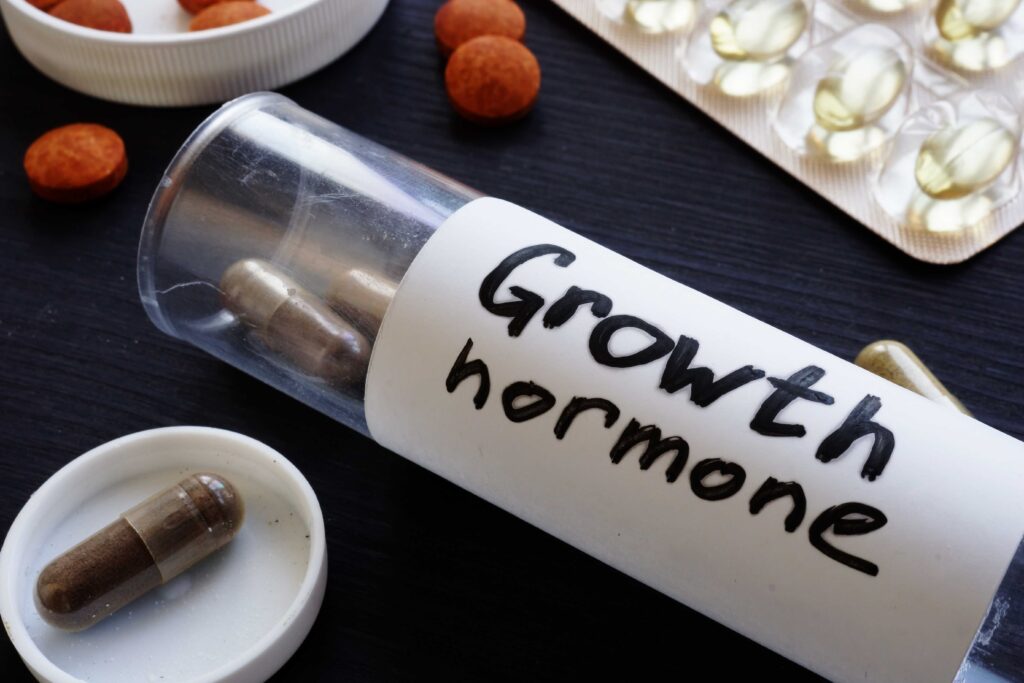After Rudman and colleagues’ statement in 1990 that Growth Hormone (GH) could revolutionize the decade as a promising treatment for healthy elderly men, this single-chain polypeptide gained widespread popularity. Despite its popularity, the question remains—does it truly provide benefits, or is it just a marketing gimmick?
It’s well-known in science that GH and IGF levels decrease exponentially with age, averaging a 14% decline per decade after puberty. In numbers, elderly individuals produce 50 mcg of growth hormone per day compared to teenagers, who can produce up to 1.0-1.5 mg per day. This age-related GH deficiency is scientifically termed “somatopause.”

To address this question, we must break it down into two components—quality of life and longevity. In other words, how does GH administration affect overall lifespan and the quality of the years lived?
ANTI-AGING FIGHT
As previously reported, Rudman and his colleagues conducted a six-month study on GH use in elderly individuals, describing positive results: respondents had improved body composition and positive dynamics affecting bone density.
However, one scientific community published this statement (name withheld):
“Our analysis shows that this practice is not supported by reliable evidence, provides few clinical benefits for healthy elderly people, and is associated with a high frequency of adverse events.”
When the American Academy of Anti-Aging Medicine heard this unflattering review, they offered their rebuttals.
The gist was: numerous studies demonstrate positive results of GH therapy; ultimately, we must be prepared in all aspects before deciding whether to consider this therapy.
LEGALITY
Another overlooked fact is the legality of using GH for anti-aging purposes in the country where this therapy is needed. Since the clinical use of GH in geriatric anti-aging medicine is considered off-label and therefore illegal in the USA, it is permitted only for the following conditions:
- Growth hormone deficiency;
- Idiopathic short stature;
- HIV/AIDS;
Despite this disclaimer, the sale of GH through online stores has become a multimillion-dollar industry. According to estimates (though incomplete), in 2004, an average of at least 30,000 people in the USA used GH for anti-aging purposes. In the past, some people tried to circumvent these legal requirements by claiming GH as a dietary supplement, but this also failed because GH was approved as a drug by the FDA back in 1940, before the Dietary Supplement Health and Education Act of 1994.
Since somatropin is only bioavailable in injectable form, it cannot be classified as a dietary supplement. By definition, dietary supplements must be intended for oral consumption.
CONTROVERSIES IN USAGE
The effects of GH use are highly predictable, so it makes no sense to stop and examine each study; in any case, we get useful information.
To summarize without overwhelming you with thousands of words:
- Numerous studies show the effectiveness of somatropin use in the first 18-24 months, followed by a decline in effectiveness.
- Important observation: women require higher doses of somatropin than men to achieve the same effect!
- There is no direct evidence that GH increases human lifespan (there is direct evidence in animals); moreover, elevated IGF-1 can accelerate aging processes.
- A thorough analysis of over 12 studies involving more than 12,000 people demonstrated a correlation between IGF levels and mortality:
- Low IGF-1 levels led to mortality related to cardiovascular diseases.
- Significantly elevated IGF-1 levels led to mortality related to cancer.
CANCER AND GROWTH HORMONE USE
Elevated IGF-1 levels correlate with an increased risk of breast and colon cancer.
Therefore, there is a strict necessity to test for tumor markers before using growth hormone.